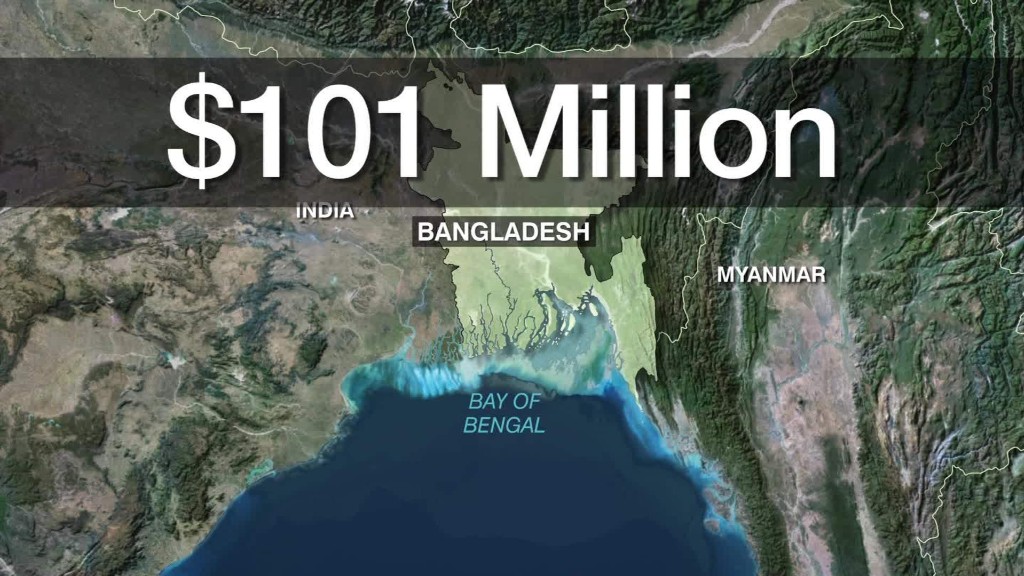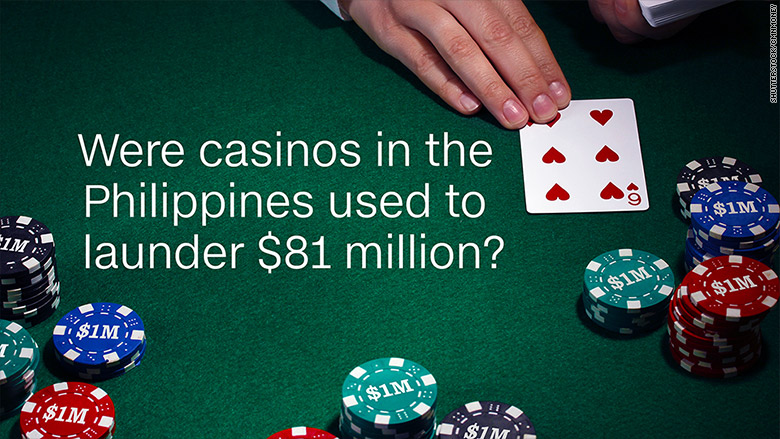
It's a real-life heist that sounds straight out of Hollywood: $101 million in stolen funds, taken from a secure account, disappeared into a murky world of casinos and money laundering.
If that's not enough drama, the caper involves at least four countries, a central bank and a pillar of the U.S. financial system.
Investigators are starting to learn just how criminals managed to steal $101 million last month from Bangladesh Bank, a complex operation that required many months of planning.
On February 1, when banks were closed for the weekend in Bangladesh, criminals executed five transfers from the central bank's account at the New York Fed. The requests looked real: They appeared to come from a Bangladesh server, and the thieves supplied the correct bank codes to authenticate the transfers.
Related: Bangladesh central bank chief resigns
Most of the stolen funds ended up in accounts located in the Philippines, while roughly $20 million, which has since been recovered, went to Sri Lanka. The robbers tried to steal $850 million more, but the requests were denied by the New York Fed.
The theft, which was made public last week, has already forced the resignation of Atiur Rahman, the governor of Bangladesh's central bank. It has also raised questions over the international banking system's vulnerability.
Money trail starts at a bank in the Philippines
This week in the Philippines, investigators revealed that the missing $81 million had been tracked to Rizal Commercial Banking Corporation, a bank in the country. From there, it went to a local money-transfer firm, and then into the country's casinos.
Senators in the Philippines were briefed on the money trail on Thursday. Macel Fernandez-Estavillo, a lawyer for RCBC, described a complex scheme uncovered during an internal investigation that implicates one of its own branch managers.
On February 5, Fernandez-Estavillo said, $81 million was deposited into accounts at RCBC. The same day, nearly $500,000 was withdrawn from one of the accounts and loaded into a car that was allegedly later driven away by a branch manager in Manilla.

Related: This is what the future of crime looks like
Four days later, as alarm bells began to ring, RCBC tried to freeze the accounts with stolen funds. But the bank manager ignored the order from headquarters and quickly moved much of the money out of the bank, Fernandez-Estavillo said.
It is not clear whether the bank manager was acting alone, or if others at the RCBC were involved. A lawyer for the bank manager told a local radio station that his client was being singled out as a "scapegoat" and accused the bank of attempting a coverup.
From RCBC, the funds went to money-transfer company Philrem, which moved them to casinos and individuals connected to the gaming industry, according to testimony before the Senate. Once the money entered the casinos, however, the trail went cold.
It could stay that way.
Investigators still tracking leads to find the masterminds
Money laundering has long plagued casinos in the Philippines, which largely operate beyond the reach of anti-money laundering authorities. The U.S. Department of State, among others, has identified the country's gaming industry as a nexus for illegal activity and money laundering.
"Transnational drug trafficking organizations based in East Asia use the existing banking system, casinos, and commercial enterprises to transfer drug proceeds from the Philippines to offshore accounts," said an agency report issued this month.
So far, investigators have not publicly revealed any strong leads that could implicate the masterminds behind the heist. It's also unclear whether the Philippines will be able to track the money that entered its casinos and recover the funds.
The Philippines' Anti-Money Laundering Council has already filed a complaint against the bank manager, who says she is willing to testify in a closed session. The agency said its investigation is ongoing.
-- Sugam Pokharel and David Goldman contributed reporting.
